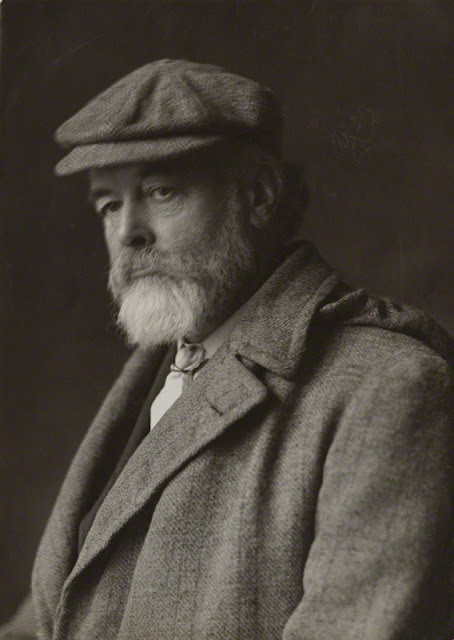Srta. Geraldine Cummins
Srta. Geraldine Cummins, F.R.G.S., escritora, hija del
fallecido Ashley Cummins de Cork, Irlanda. Notable escritora automática,
recibía las comunicaciones presumiblemente de Felipe el Evangelista, Cleofás y
F. W. H. Myers. El desarrollo de su mediumnidad se produjo en diciembre de 1923
en las sesiones con la Srta. E. B. Gibbes. Ella nunca estudió teología o
materias afines. Viajó a lo largo y ancho, pero nunca visitó Egipto o
Palestina. Por lo general su trabajo de composición fue muy lento. Su escritura
automática iba a una velocidad notable. El 16 de marzo de 1926 se escribieron
11750 palabras en una hora y cinco minutos. Su primer libro fue Los Escritos de Cleofás que complementa
a los Hechos de los Apóstoles y las Epístolas de San Pablo. Es una narrativa
histórica de la iglesia primitiva y el trabajo de los apóstoles inmediatamente
después de la muerte de Jesús y la salida de San Pablo de Berea hacia Atenas.
En la producción de las dos primeras secciones del libro de la Srta. Cummins se
asoció con F. Bligh Bond. Sin embargo, ella recibió las escrituras de forma
independiente después. En su segundo volumen,
Pablo en Atenas, la narrativa continuó. En el tercero: Los Grandes Días de Efeso, sigue la misma línea de pensamiento. La
producción de escrituras automáticas fue presenciada por eminentes teólogos y
otras autoridades. Reconocidos estudiosos editaron sus libros respaldando su
intrínseco mérito. Fueron aceptados por su valor nominal en aquella época.
Ellos dan un nuevo significado a varios pasajes oscuros de los Hechos de los Apóstoles, indicando una
relación estrecha con el círculo apostólico. Hay tanto contenido que milita en
contra de su origen subliminal. Por dar un ejemplo, sólo un estudiante muy
experimentado podría haber dado el nombre del jefe de la comunidad judía en
Antioquía que era nombrando Archon,
título habitual Etnarca no mucho antes de la época mencionada en la Crónica de
Cleofás. Cleofás no fue el mensajero directo, sino que llegó a través de otra
entidad. En total siete escribas se intercambiaron para escribir Cleofás. Sobre
la crónica, sí se afirmó que fue conocida por la iglesia primitiva, pero como
fueron poco ejemplares desaparecieron.
En el cuarto libro de la Srta. Cummins: El Camino a la Inmortalidad, una serie de comunicaciones que afirma
haber sido transmitidas por F. H. W. Myers, da una visión estupenda de la
progresión del espíritu humano a través de la eternidad. Sir Oliver Lodge, en
su prefacio paga el siguiente tributo: "Creo que se trata de un verdadero
intento por transmitir ideas, más o menos verdaderas, a través de un amanuense
de educación razonable, caracterizado por su disposición al servicio dedicado y
con honestidad transparente."
Enciclopedia de Ciencias Psíquicas - Nandor Fodor
***********************************
CUMMINS,
Miss GERALDINE, F.R.G.S., authoress, daughter of the late Professor
Ashley Cummins of Cork, Ireland, remarkable automatic writer, receiving
communications alleged to emanate from Phillip the Evangelist, Cleophas and F.
W. H. Myers. The development of her mediumship began in December, 1923, in
sittings with Miss E. B. Gibbes. She never studied theology or kindred
subjects. She travelled far and wide but never visited Egypt or Palestine.
Ordinarily her work of composition is very slow. In her automatic writing the
speed is remarkable. On March 16, 1926, 11750 words were produced in one hour
and five minutes. Her first book, The Scripts of Cleophas supplements
the Acts of the Apostles and the Epistles of St. Paul. It is a historic
narrative of the early church and the work of the apostles from immediately
after the death of Jesus to St. Paul's departure from Berea for Athens. In the
production of the first two sections of the book Miss Cummins was associated
with F. Bligh Bond. But she received the scripts independently afterwards. In
her second volume, Paul in Athens the narrative is taken up and
continued. The third: The Great Days of Ephesus follows the same line of
thought. The production of these automatic scripts was witnessed by eminent
theologians and other authorities. Recognised scholars who edited her books
endorsed their intrinsic merit. Accepted at face value, they are epoch making.
They give new meaning to several obscure passages in the Acts of the Apostles,
they Show close acquaintanceship with the apostolic circle and that age. They
contain much which militates against subliminal origin. To take a single
instance, only a very profound student could have given the head of the Jewish
community in Antioch the title of Archon as the usual title was Ethnarch not
long before the time referred to in the chronicle of Cleophas. Cleophas was not
the immediate agent in their production. They came through the
"Messenger." Altogether seven scribes were stated to be guided by
Cleophas. The chronicle itself was stated to have been known in the early
Church but the existing few copies perished.
The fourth book of Miss Cummins: The Road
to Immortality, a series of communications which F. W. H. Myers claims to
have sent through, gives a stupendous vision of the progression of the human
spirit through eternity. Sir Oliver Lodge, in his preface pays the following
tribute, "I believe this to be a genuine attempt to convey approximately
true ideas, through an amanuensis of reasonable education, characterised by
ready willingness for devoted service, and of transparent honesty."
***********************************
Srta. Geraldine Cummins
San Felipe
Ashley Cummins
Frederick Bligh Bond
Silvia Constance Myers; Frederic William Henry Myers; Harold Hawthorn Myers
Sir Oliver Joseph Lodge







